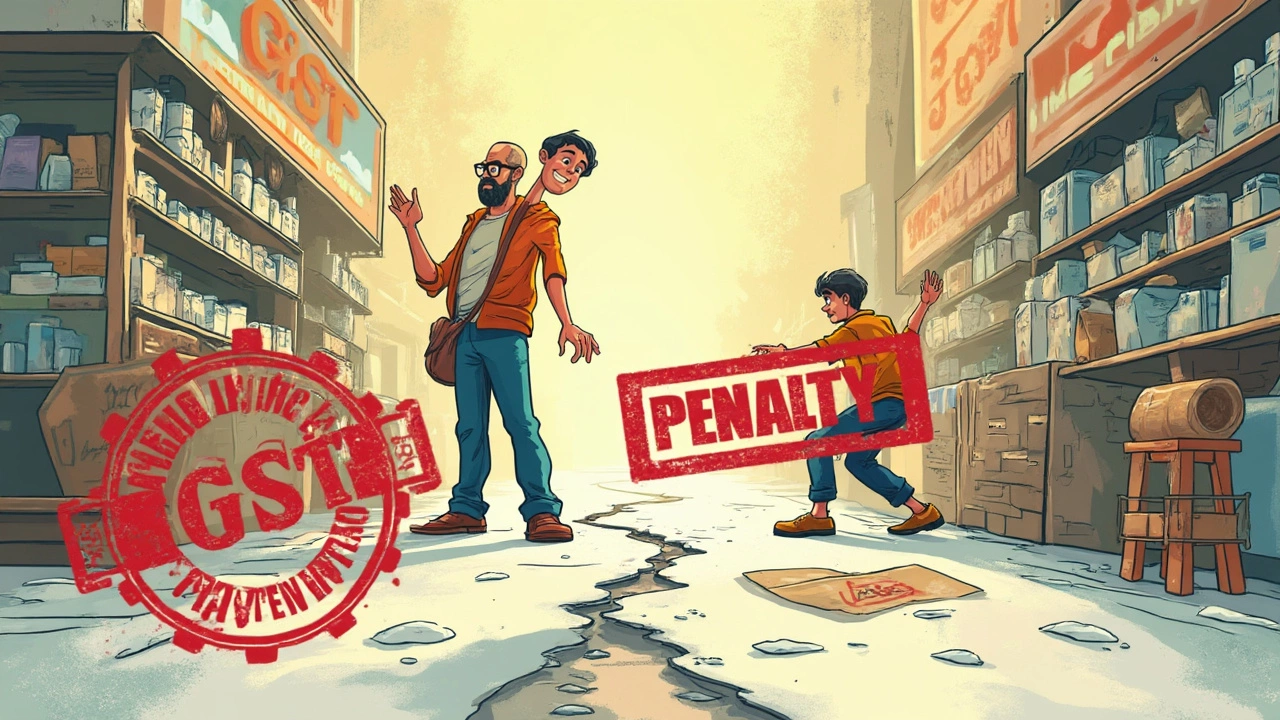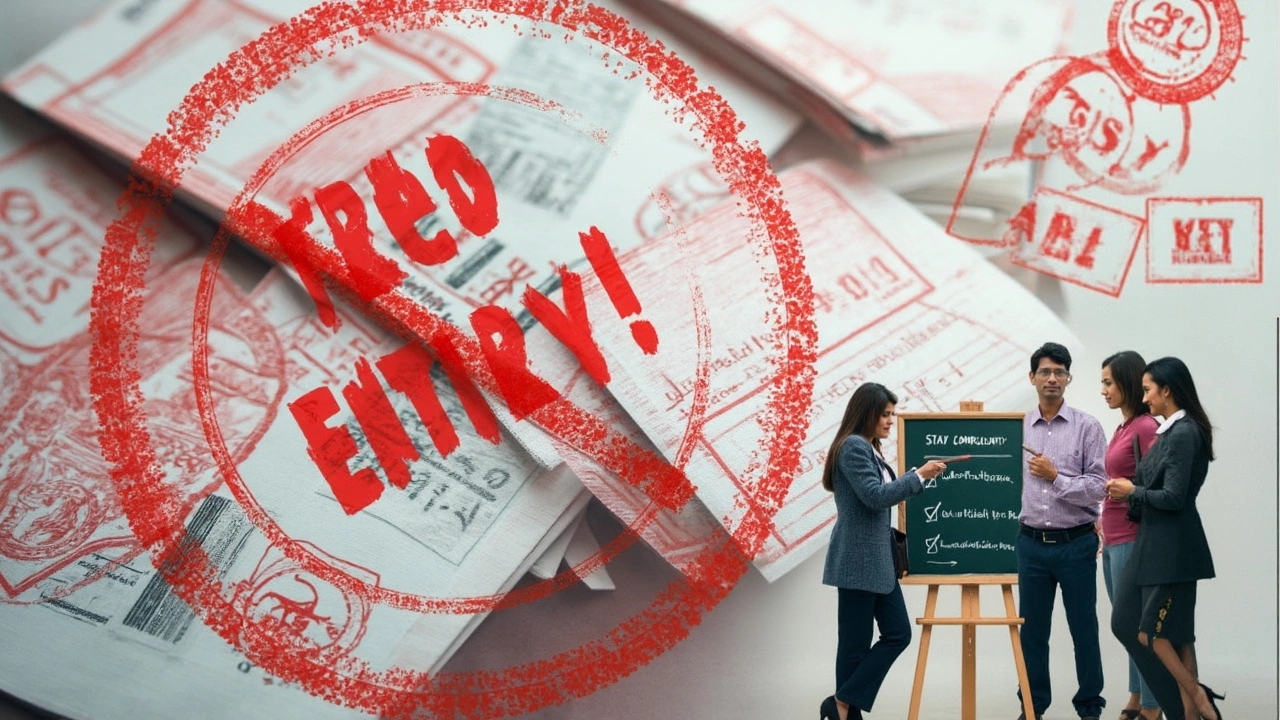Heard someone say you can simply add GST to your bills, even if you’re not registered? Don’t fall for it. In India, GST is strictly regulated. If your business isn’t registered for GST, you have no legal right to collect it from your customers. Sounds harsh, but this keeps things fair for everyone and protects consumers from being ripped off.
Trying to sneak GST onto your invoice when you don’t have a GSTIN isn’t just frowned upon—it’s illegal. Authorities can catch up with you fast, and the penalties are nothing to joke about. If you’re thinking about GST for your business, you need to know what counts as legitimate, and what’s a one-way ticket to legal problems.
- What GST Registration Really Means
- Who Needs to Register and When
- What Happens If You Charge GST Without Registering
- Spotting the Common Mistakes
- Smart Ways to Stay on the Right Side of the Law
What GST Registration Really Means
So, what’s the big deal about GST registration? It’s basically your legal entry ticket to collect and pay the Goods and Services Tax in India. Without it, you’re not allowed to charge GST on anything you sell or any service you offer. It’s not just a formality—the government gives you a unique GSTIN (that’s Goods and Services Tax Identification Number) once you’re registered. That number is essential. You put it on every tax invoice, in your paperwork, and it’s how the authorities trace things if they ever want to audit your business.
Getting registered tells the tax system, “Hey, I’m a legit business.” It also opens you up to some perks. For example, only a registered person can claim input tax credit. This means you get to subtract the GST you’ve already paid on your business purchases from the GST you collect from your customers. Without registration, you lose this benefit entirely.
Here’s what comes with being registered under GST:
- You’re officially allowed to collect GST and show it on your invoices.
- You can claim input tax credit for taxes you’ve paid on your own business purchases.
- Your business appears more credible—many companies will only buy from or hire GST-registered vendors.
- You have to file regular GST returns, even if you didn’t do much business that month.
- The government expects you to stick to GST rules, or they’ll hit you with fines or even legal action.
According to data from the Ministry of Finance as of March 2024, there are around 1.48 crore registered GST taxpayers in India. That’s nearly 15 million businesses that followed the rules and went legit. If you’re serious about growing your business or dealing with big clients, GST registration is something you just can’t avoid.
Who Needs to Register and When
If you’re running a business in India, it’s not a guessing game—you need to know the GST registration rules down cold. The government doesn’t just hand you a free pass to skip it if you feel like it. Here’s how it works.
First up, the magic number: If your business turns over more than ₹40 lakh a year (that’s total sales, not just profit) for goods, or ₹20 lakh for services, GST registration isn’t optional. You have to get registered. If you’re in special category states like the North East and hill states, the limit is down to ₹10 lakh.
- Trading goods: Register once you hit ₹40 lakh (or ₹20 lakh for special states).
- Providing services: Register at ₹20 lakh (or ₹10 lakh for those special states).
- Online selling: Got an e-commerce gig? Even if you sell one item on Amazon or Flipkart, you need to register for GST, no matter your turnover.
- Dealing with interstate supply: Shipping your product or service outside your own state? That means mandatory GST registration from day one, even if sales are tiny.
FYI, here’s a quick breakdown for different limits in a handy table:
| Type of Supply | Threshold (Normal States) | Threshold (Special States) |
|---|---|---|
| Goods | ₹40 lakh | ₹20 lakh |
| Services | ₹20 lakh | ₹10 lakh |
One more thing: If you’re a casual taxable person (temporary business, like a trade show), a non-resident in India, or simply want to claim GST credits, you need to register no matter your sales.
Don’t try to dodge these rules. GST officers are big on digital trails—they track invoices, e-commerce sales, and even payment apps. If you’re close to the limit or unsure, play it safe and register. Skipping GST registration when you need it can get expensive fast.

What Happens If You Charge GST Without Registering
If you’re not registered under GST and you tack on GST to your invoice, get ready for hassles. It’s straight-up illegal under Indian law. The GST Act spells it out: only a business with a valid GST registration (that’s a GSTIN) can collect GST from customers. If you do it without registering, you’re asking for trouble.
Here's what can actually go wrong if you try this move:
- Hefty Penalties: Authorities can slap you with a penalty of either Rs. 10,000 or the tax amount you wrongly collected—whichever is higher. That stings for a small or medium business.
- You Can’t Keep the Money: Even if you collected GST from your customers, that money isn’t yours. You have to pay it back to the government, plus you might end up paying interest on top.
- Legal Action: Cases have happened where businesses got notices, their accounts frozen, and their reputation badly damaged.
- No Input Tax Credit for Customers: Your clients can’t claim an input tax credit if you’re not properly registered, which can ruin business relationships fast.
Curious how common this is? The GST Council flagged more than 35,000 cases where unregistered sellers tried sneaking in GST charges, leading to hundreds of enforcement actions just last year. It’s not worth chancing it.
So, bottom line: unless you have a valid GST registration, never charge GST. The authorities aren’t joking about this, and the risks far outweigh any short-term gain.
Spotting the Common Mistakes
If you’re running a business in India and don’t fully get GST registration rules, you’re not alone. Loads of businesses trip up in similar ways when it comes to GST. These slip-ups can end up burning a hole in your pocket, so let’s break down exactly where most people go wrong.
First up, trying to charge GST on invoices without a valid GSTIN is a big red flag. Some people think, "I’ll just add GST and register later—nobody will know." Not true. If you’re not in the GST system, you can’t collect or claim it, end of story.
- Adding fake GST numbers: Plenty of cases come up where small vendors slap random numbers on invoices, hoping clients won’t notice. But tax officers do check. If you get caught, you’re staring at fines or legal action.
- Thinking the composition scheme lets you charge GST: Under the GST composition scheme, you pay a lower tax rate to the government out of your own pocket, but you cannot charge GST on your sales bill. A lot of small business owners get mixed up here.
- Assuming casual or occasional sales don’t need GST: Even if you sell only a couple of times a year, if your turnover crosses the threshold, you must register. Selling at trade fairs or exhibitions without registration and adding GST is a no-go.
- Using the old VAT or Service Tax registration instead: GST replaced those in 2017. Still see old numbers pop up on bills. That’s not legal anymore for GST-related transactions.
- Believing small transactions are ignored: Tax authorities use data analytics to track GST compliance. Even if your sales are below the threshold, if you’re seen charging GST, they can still pull the plug on you.
If you’re dealing with retail or B2B clients, most will expect you to show a valid GSTIN on every tax invoice. Getting sloppy here is a sure way to lose trust and land on a government radar.
| Mistake | What Actually Happens |
|---|---|
| Charging GST without registration | Hefty fines and possible legal action |
| Showing a fake GSTIN | GST authorities can block your PAN or bank accounts |
| Claiming input credit as unregistered | Input credits get reversed, plus you’ll owe penalties |
Sticking to the rules and only issuing invoices with GST when you’re fully registered saves you from a lot of pain. If in doubt, double-check before you print or send out that next invoice.

Smart Ways to Stay on the Right Side of the Law
If you don’t want to mess up your business and face penalties, getting the basics of GST registration right matters a lot. Here’s how you can avoid trouble and keep things smooth.
- Check if You Need to Register: In India, if your annual turnover crosses ₹40 lakh (for most states) or ₹20 lakh (for certain special category states), GST registration is mandatory. If you run an online store or supply goods across state lines—registration is a must, turnover or not.
- Apply for GSTIN Before Charging: Don’t even think about adding GST on your bills until you have your GSTIN. You can register online through the official GST portal (https://www.gst.gov.in). No paperwork headaches, just basics like PAN, proof of address, and your business details.
- Know When You’re Exempt: Some services and products, like agricultural produce or tuition for basic education, are out of GST’s scope. If this sounds like your business, you don’t have to register—but don’t charge GST either.
- Keep Records Up to Date: Good record-keeping isn’t just for big companies. If you ever hit the threshold or decide to expand, having your sales and purchase data ready makes registration and compliance easy. Don’t rely on memory—set up a spreadsheet or use simple software.
- Never Issue a Fake Tax Invoice: This is something GST officers look for. Only registered folks can give out tax invoices that charge GST. If you’re not registered and you give one, penalties can go as high as 100% of the tax involved—even jail in extreme cases. Not worth the risk.
Need a quick look at penalty risks? Here’s what happens if you charge GST without being registered:
| Action | Possible Consequence |
|---|---|
| Charging GST without registration | Penalty up to 100% of the tax or ₹10,000, whichever is higher |
| Issuing a fake GST invoice | Heavy fines, plus possible jail time |
| Collecting GST but not depositing with the government | Interest charges and further prosecution |
If you’re ever confused, talk to a chartered accountant who knows Indian GST rules. Small check-ins now can save you major headaches later. Keeping things legal isn’t just about avoiding fines. It keeps your business reputation solid, helps you grow, and keeps the tax guys off your back.


